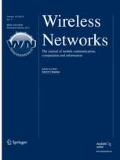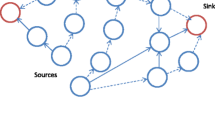Abstract
The paper presents a routing algorithm that maximizes the lifetime of a sensor network in which all data packets are destined for a single collection node. Lifetime is maximized by adjusting the number of packets traversing each node. The adjustment is carried out by transmitting over alternative routes. The first part of the paper assumes that the worst case delay resulting from energy efficient routing is less than the maximum tolerable value. Ignoring the delay constraint of the network, the routes are selected as the solution to a linear programming (LP) problem in which the objective is to maximize the minimum lifetime of each node. The solution is implemented in a centralized algorithm, and then approximated by an iterative algorithm based on least cost path routing, in which each step is implemented efficiently in a distributed manner. The second part of the paper incorporates delay guarantee into energy efficient routing by constraining the length of the routing paths from each sensor node to the collection node. Simulations reveal that the lifetime of the network increases significantly by optimal routing, and including delay constraint in energy efficient routing improves the network performance since the delay of the network keeps increasing as the delay constraint is relaxed beyond the value at which the optimal lifetime is achieved.
Similar content being viewed by others
References
J. Polastre, R. Szewczyk, C. Sharp and D. Culler, The Mote Revolution: Low Power Wireless Sensor Network Devices, Hot Chips 16: A Symposium on High Performance Chips (Aug. 2004).
S.C. Ergen and P. Varaiya PEDAMACS: Power Efficient and Delay Aware Medium Access Protocol for Sensor Networks, to appear in IEEE Transactions on Mobile Computing (2005).
S. Coleri, PEDAMACS: Power Efficient and Delay Aware Medium Access Protocol for Sensor Networks, Master Thesis, University of California, Berkeley (Dec. 2002).
E.M. Royer and C. Toh, A Review of Current Routing Protocols for Ad Hoc Mobile Wireless Networks, IEEE Personal Communications (April 1999) pp. 46–55.
S. Singh, M. Woo and C. Raghavendra, Power-aware Routing in Mobile Ad Hoc Networks, MOBICOM (1998) pp. 181–190.
J.H. Chang and L. Tassiulas, Maximum Lifetime Routing in Wireless Sensor Networks, IEEE/ACM Transactions on Networking, Vol.12, issue. 4 (Aug. 2004).
M. Bhardwaj and A.P. Chandrakasan, Bounding the Lifetime of Sensor Networks Via Optimal Role Assignments, IEEE INFOCOM (2002) pp. 1587–1596.
F.J. Block and C.W. Baum, Energy-Efficient Self-Organizing Communication Protocols for Wireless Sensor Networks, IEEE MILCOM (2001).
F.J. Block and C.W. Baum, An Energy-Efficient Routing Protocol for Wireless Sensor Networks with Battery Level Uncertainty, IEEE MILCOM (2002).
C.K. Toh, Maximum Battery Life Routing to Support Ubiquitous Mobile Computing in Wireless Ad hoc Networks, IEEE Communications Magazine (June 2001) pp. 138–147.
E. Uysal-Biyikoglu, B. Prabhakar and A. El Gamal, Energy-Efficient Packet Transmission over a Wireless Link, IEEE/ACM Transactions on Networking, Vol. 10, No. 4 (Aug. 2002).
Swetha Narayanaswamy, Vikas Kawadia, R.S. Sreenivas and P.R. Kumar, Power Control in Ad-Hoc Networks: Theory, Architecture, Algorithm and Implementation of the COMPOW protocol, Proceedings of European Wireless 2002 (Feb. 2002) Italy.
R. Cristescu, B. Beferull-Lozano and M. Vetterli, On Network Correlated Data Gathering, IEEE INFOCOM (2004).
R.K. Ahuja, T.L. Magnanti and J.B. Orlin, Network Flows, Prentice Hall (1993).
B. Krishnamachari, S.B. Wicker and B. Bejar, Phase Transition Phenomena in Wireless Ad-Hoc Networks, Symposium on Ad-Hoc Wireless Networks, GlobeCom 2001, San Antonio, Texas (Nov. 2001).
Author information
Authors and Affiliations
Corresponding author
Additional information
Research supported by National Science Foundation under Grant CMS-0408627 and California Department of Transportation.
Sinem Coleri Ergen received the BS degree in electrical and electronics engineering from Bilkent University, Ankara, Turkey, in 2000, and the M.S. and Ph.D. degrees in electrical engineering and computer sciences from University of California Berkeley (UCB), in 2002 and 2005. Since January 2006, she has been a postdoctoral researcher in electrical engineering at UCB. Her research interests are in wireless communications and networking with a current focus on energy efficient system design for sensor networks. She is a member of the Sensor Networks for Traffic Monitoring project at UCB. She received Regents Fellowship from University of California Berkeley in 2000.
Pravin Varaiya is Nortel Networks Distinguished Professor in the Department of Electrical Engineering and Computer Sciences at the University of California, Berkeley. From 1975 to 1992 he was also Professor of Economics at Berkeley. From 1994 to 1997 he was Director of the California PATH program, a multi-university research program dedicated to the solution of Californias transportation problems. His current research is concerned with communication networks, transportation, and hybrid systems. He has taught at MIT and the Federal University of Rio de Janeiro. Varaiya has held a Guggenheim Fellowship and a Miller Research Professorship. He received an Honorary Doctorate from LInstitut National Polytechnique de Toulouse, and the Field Medal of the IEEE Control Systems Society. He is a Fellow of IEEE and a member of the National Academy of Engineering. He is on the editorial board of several journals, including “Discrete Event Dynamical Systems” and “Transportation Research—C”. He has co-authored three books and more than 250 technical papers. The second edition of “High-Performance Communication Networks” (with Jean Walrand) was published by Morgan-Kaufmann in 2000. “Structure and interpretation of signals and systems" (with Edward Lee) was published by Addison-Wesley in 2003. Varaiya is a member of the Board of Directors of Sensys Networks.
Rights and permissions
About this article
Cite this article
Ergen, S.C., Varaiya, P. Energy efficient routing with delay guarantee for sensor networks. Wireless Netw 13, 679–690 (2007). https://doi.org/10.1007/s11276-006-8149-y
Published:
Issue Date:
DOI: https://doi.org/10.1007/s11276-006-8149-y




